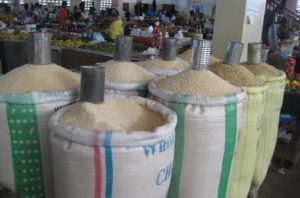Last week, reports filtered in that the Ebonyi State Government has put on top gears its plans to enforce total ban on the sale of foreign rice in markets and other outlets in the state.
The state is contemplating a tax force consisting of the State Executive Council and led by the Governor, David Umahi to enforce stoppage of sales and consumption of imported rice in Ebonyi.
Expectedly, reactions from Nigerians went wild in no time, with the people divided in support or against such move in the state.
The fears of those against it were not strange, as rice is one of the most common staple foods for Nigerians anywhere in the country. In fact, Nigerians consume about 5.5 million metric tons of rice annually.
With about 3.6 million metric tons of rice now said to be produced in the country each year, in the last couple of years, the country still have to import a shortfall of about 1.9 million metric tons of rice to fill the gap. This imported volume puts Nigeria among the highest importers of rice in the world, with the country spending about N365 billion every year on rice importation.
Suffix to say that the Federal Government has had to ban importation of rice from the land borders, while placing a prohibitive tariff of 110 per cent on rice imported through the ports. This is one bold policy the government engaged in discouraging importation of the product, while also churning out billions of naira to help local producers and millers find their feet in the business of growing and producing rice to feed Nigerians locally. But how successful this has been remain questionable, as people are yet to see in significant volume, rice produced in the country, especially in big cities of the south, such as Lagos and Port Harcourt where there is high population of consumers.
Where optional, imported parboiled rice should not be given preference. This is because, parboiled after six months turns to chaff as most of them brought into the country stay for about 10 years before being imported.
We believe that the plan of the Ebonyi Government is a policy in the right direction that needs careful considerations. This is because the responsibility of fiscal policy regulations lies with the Federal Government and outright ban of imported rice is one of a fiscal policy, as it would affect the general import trade of the nation. Where the state government has powers to effect this kind of decision, it would clearly need a backing of an act of the state legislature. Therefore, the state may have to consider other milder restrictive measures than outright banning of imported rice.
The state should continue investment in rice production and milling and works assiduously on making the product finer. Once the people can get good quality rice readily available and affordable, no more force would be needed to regulate the market.
However, Ebonyi State is one of the seven biggest producers of rice in Nigeria, with virtually every family growing rice for both subsistence and small scale commercial purposes. Already, the state has three functional rice mills and plans to inaugurate mills in the 13 Local Government Areas of the state before the end of 2017.
When the new mills come on stream, the state plans to hand them over to the private sector, in a public private partnership programme that would favour investors that show zeal and commitment to the project. According to the Governor, the government would “then aggregate and sell the mills to them with the government maintaining about 20 per cent minimum equity shares and the stakeholders, 80 per cent.”
Employing well thought out restrictive measures on imported rice can have dual positive effect of attaining self-sustenance and creating employment for the teaming youth population of the state, who have taken a new trade in hawking on Lagos roads.
As one of Nigeria’s biggest producers of rice and every home producing rice, Ebonyi State is currently evidently beyond halfway in its pursuit of self-sustenance in rice production.
We encourage other states, especially those that have benefitted in past and present government pro-rice production programmes to think in the direction of finding ways to boost local production in order to discourage importation. Gradually, such states could form viable supply sources for the whole of the country. At the moment, rice producing states include Kano, Niger, Kebbi, Gombe and Anambra, which are now homes for UMZA Rice, Mama Happy Rice, Labana Rice, Mas Rice and Anambra Rice respectively.
Other major rice producing states include Nasarawa—Olam Rice, Ogun—Ofada Rice and Ekiti—Igbemo Rice. Growing of rice is also taking place in some parts of Edo, Rivers, Bayelsa, Sokoto and Cross River states.
As part of the government’s commitment to local production of rice, the Central Bank of Nigeria (CBN) last week said its Anchor Borrowers Programme for the promotion of agriculture had set the country to begin exportation of rice by 2017.
The Anchor Borrowers Programme of the CBN and the Presidential Committee on Rice Production launched in July had jointly set the target.
According to the Acting Director of Corporate Communications of the apex bank, Isaac Okorafor, farmers in Kebbi, Jigawa, Ebonyi, Sokoto and Cross River states, among others, have already keyed into the programme, resulting in massive rice cultivation.
With about 3.6 million metric tons of rice already achieved locally, only a moderate commitment from the various states producing rice, supported by the Federal Government’s rice production programme is needed. And Nigeria would better for it, pulling free from the huge loss of foreign exchange spent in importing not-so-good rice, with consequent loss of job and risk and losses of both people and money associated with smuggling of the product through land borders.
Copyright Ships & Ports Ltd. Permission to use quotations from this article is granted subject to appropriate credit given to www.shipsandports.com.ng as the source.

